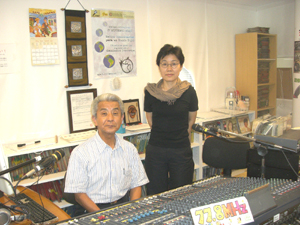It is important to keep reviewing what we need and what we should do.
Chief of Seikatsu Kobo DO: Keiko Doi
Talk 1
– Flooding had recently hit parts of central and southwest Hyogo Prefecture –I went to Toyokoka as a volunteer when it was hit by floods. Tatami and floor boards had to be removed to remove mud from the houses. The damage was terrible and an awful smell was left afterwards. I also remember a huge amount of washing being put out to dry.When the earthquake happened I was living in Ohashi 10-chome. My apartment building was made of reinforced concrete, and though it was damaged, it survived. My husband opened the front door to secure an escape route, but all we could see were flames. Of course the elevator wasn’t working so I used the stairs. But because I had used them regularly, it was natural to use them then.
I lived in Bangladesh for 3 years as an overseas aid worker. My experience living in a developing country helped me be prepared for when the earthquake happened. I learned that the unexpected can happen at any time. As a child I lived in the east of Hokkaido where they have many earthquakes and disaster prevention drills are very common, and my husband is from Shizuoka where they also have many evacuation drills, so we are usually prepared for the unexpected. If you are not trained in something, you won’t be able react.After the earthquake at first we just took things as they came, and after about 1 month we moved to a new residence in Takarazuka. We, like many other people who left Kobe at the time, intended to come back someday. At the time, I was a home-care welfare coordinator, but even though I was a professional responsible for other people’s welfare, I could do nothing except look after our own needs. It hurts when I think back and didn’t do anything for anyone. Now I try to do something for others.
I am chief of Seikatsu Kobo DO center, and give lessons on how to enjoy everyday life at the center, public centers and even in private houses. At the center about 90% of the particpants are women, but at public centers there many men, depending on the theme. The most recent theme was ‘how to avoid piling up unwanted things’. The important thing is to keep things sorted so you will know what you want and need and what you don’t. Keeping the things you need everyday where you can find them and keeping other things ready to use or give to others is important.
Talk 2
Things are just things. But people attach affection for to them and then can’t release them, making the excuse it’s wasteful to do so. When the earthquake happened I was still in my thirties and hadn’t thought as much about everyday life as I do now. When I saw smoke coming from the buildings I thought it wasn’t important to think about things, placing importance on everyday life is more important. Things are only instruments to make life enjoyable. One cup or one towel can be important depending on the circumstances. But even losing these things is not important. What is important is using them to make live better. The item doesn’t have to be expensive or gorgeous. It just has to help make your life happier in some way.
The lessons I learned when the earthquake happened were the starting point for my Seikatsu Kobo DO activities. Making the most of every day prepares us for tomorrow. This also applies to human relations and family communication. Making the home a brighter and better place for everyone to use is the message I try to get across in my lifestyle classes.
I feel I was left with homework to do after my experiences from the earthquake. I feel this is the core for my activities and messages I try to pass on. With those experiences in mind I think of my lifestyle and family and try to pass on what I have learned to others. Those experiences gave me to opportunity to think about these things.
Sometime there are troublesome relationships in the community and we might feel it would be easier to move out. But rather than running away, it is better to work on the relationship and do something. The earthquake taught us many things. It taught us that the community is made up of all kinds of people, some of them we may not like, but we still have to try to get along with them. I think this is another piece of homework we were given from the earthquake.
If I am asked to give advice on how to be prepared for a disaster, my answer would be to have a lifestyle that is easy for others to see and understand, so that they can help if necessary. By this I don’t only mean one’s material lifestyle but how open one is to others. It is important to be aware of little things, everyday things and keep them in order, to pay attention to where and how we place things in the house so as to prevent injury or damage. The things that are important to us change all the time, with the seasons, etc. so it is important to keep reviewing what we need and what we should do.
I have appeared on Nishinomiya’s Sakura FM program ‘Kurashi no hint’ since the station was founded about 12 years ago giving hints, on how to enjoy everyday life, including emotional problems. Most of my advice comes from what I think about every day.

